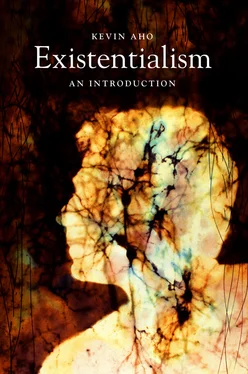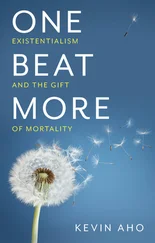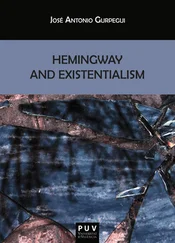Although it cannot be reduced to a unified school of thought, and the major figures vary widely in their views, the common thread that ties these thinkers together is their concern for the human situation as it is lived . This is a situation that cannot be reasoned about or captured in an abstract system; it can only be felt and made meaningful by the concrete choices and actions of the existing individual. From this shared concern, there are a number of overlapping themes that emerge in the writings that make it possible for us to group them together under a common heading.
Existence precedes Essence : Existentialists forward the idea that humans exist in a way that is different from other things — such as trees, cultural artifacts, and animals. We cannot be understood as mere things that are objectively present because we exist , that is, we make choices and take action throughout our lives. This means there is no pre-given ‘essence’ that determines who and what we are. We are self-making beings that become who we are on the basis of the choices and actions we make as our lives unfold. On this view, there is no definitive or complete account of being human because there is nothing that grounds or secures our existence; we are a ‘not yet,’ always in the process of realizing who we are as we press forward into future projects and possibilities.
The Self as a Tension : By interpreting existence as a process of self-making rather than as an object or thing, existentialists suggest that the structure of the self involves a tension or struggle between what can be called ‘facticity’ and ‘transcendence.’ On the one hand, we are determined by our facticity, where this is understood as the limitations of our factual nature such as our physiology, sexuality, and sociohistorical situation. On the other hand, insofar as we are self-conscious and aware of our limitations, we can transcend or surpass them by taking a stand on them, that is, by choosing to interpret them in certain ways, giving them meaning, and, thus, creating our own identities.
The Anguish of Freedom : As beings that can take a stand on our facticity, existentialists generally agree that we are free and responsible for who we are and what we do. But this realization is often accompanied by anguish because it reminds us that we alone are responsible for the choices and actions we make in our lives. Existentialists reject the idea that there are moral absolutes, utilitarian calculations, or natural laws that can explain or justify our actions. As Sartre writes, when it comes to human actions, “there are no excuses behind us nor justifications before us” (2001, 296).
The Insider's Perspective : Because human existence is not a thing that can be studied from a perspective of detached objectivity, existentialists hold the view that we can understand ourselves only by taking what might be called an ‘insider's perspective.’ That is, prior to any disinterested theorizing about who or what we are, we must first come to grips with the experience of being human as it is lived within the context of our own situation. For this reason, existentialists reject the idea that there can be objectivity when it comes to giving an account of human existence. Any account of what it means to be human is already mediated by the contextual interweaving of our social involvements, bodily orientation, emotions, and perceptual capacities.
Moods as Disclosive : For the existentialists, we do not gain knowledge of the human situation through detached thought or rational demonstration but through the affective experiences of the individual. We understand what counts or matters in our lives through our moods, through the ways in which we feel about things. Some moods, such as ‘ anxiety ’ (Heidegger), ‘ nausea ’ (Sartre), ‘ guilt ’ (Kierkegaard), and ‘ absurdity ’ (Camus), are especially important for the existentialists because they have the capacity to shake us out of our everyday complacency and self-deception by disclosing the fundamental freedom and finitude of our situation. This, in turn, allows us the opportunity to be honest with ourselves and own up to our lives with renewed passion, intensity, and focus.
The Possibility for Authenticity : Because we have a tendency to conform to the leveled-down roles and identities of the public world, the question of authenticity, of being true to oneself, is central to the existentialists. The idea is formulated in many different ways, in terms of being a ‘knight of faith’ (Kierkegaard), for example, an ‘overman’ (Nietzsche), a ‘rebel’ (Camus), or an ‘authentic individual’ (Heidegger). In this way, existentialists develop the possibility of living a meaningful, committed, and fulfilling life in the face of absurdity and death. The idea of authenticity serves as a powerful rejoinder to the criticism of existentialism as representing a kind of nihilistic, ‘anything goes’ philosophy.
Ethics and Responsibility : Existentialism does not require adherence to any normative moral principle. Yet the argument that existentialism is an amoral philosophy is undeserved. Existentialism centers around the most fundamental of moral questions: ‘ What should I do ?’ and ‘ How should I live ?’ Moreover, in acknowledging our fundamental freedom, existentialists recognize that we are not free from taking responsibility for our actions or from cultivating the ideal of freedom for others. To this end, existentialism offers a clear vision of what a valuable or praiseworthy way of life is. It is a life that faces up to the inescapable freedom and vulnerability of the human situation, and takes responsibility for the fact that our actions have consequences and impact the lives of others.
The justification for a new introduction to existentialism is difficult given the number of high-quality monographs published on the topic over the last six decades. Beginning with William Barrett's path-breaking Irrational Man: A Study in Existential Philosophy in 1958, a number of early secondary works in English stand out, notably Calvin O. Schrag's Existence and Freedom (1961), Robert Olson's An Introduction to Existentialism (1962), John Macquarrie's Existentialism (1972), and Robert Solomon's From Rationalism to Existentialism: The Existentialists and Their Nineteenth-Century Backgrounds (1972). Despite their significant contribution, these texts are now quite outdated. More recently, Thomas Flynn has written a crisp and engaging little book called Existentialism: A Very Short Introduction (2006), but, because of its brevity, it is unable to engage a wide range of thinkers or develop key issues in sufficient detail. Without question, it is David Cooper's Existentialism: A Reconstruction (1990; 2nd ed., 1999) that has set the standard in terms of comprehensiveness and bringing existentialism up to date and into conversation with core themes in mainstream Anglophone philosophy. My aim in this book is to follow Cooper's lead in emphasizing existentialism's enduring relevance to contemporary philosophy, but I try to draw on a wider range of philosophical and literary figures and address themes that are often neglected or underdeveloped in other introductory works.
There is a tendency in the secondary texts to focus narrowly on the ‘big four,’ Kierkegaard, Nietzsche, Heidegger, and Sartre. This approach is understandable given the enormous philosophical and cultural impact of these figures, but it tends to overlook the significance of religious and literary existentialists such as Dostoevsky, Camus, Tolstoy, Marcel, Unamuno, and Buber, as well as feminist figures such as Beauvoir. In some introductions, the influence of Nietzsche's philosophy is minimized because he rejects one of the central tenets of existentialism, namely that human beings are radically free and, therefore, morally responsible for their actions. There are also crucial themes of embodiment and being-in-the-world that are often undeveloped, and there is sometimes a failure to situate existentialism within the historical context of modernity. Finally, there is the issue of the significant influence that existentialism has had in the applied fields of medicine, psychiatry, and psychotherapy, an impact that is often glossed over in introductory texts.
Читать дальше












